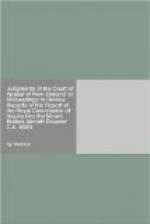Scope of Royal Commission
As has been the practice in New Zealand when a Commission of Inquiry consists only of or is chaired by a High Court Judge, the Erebus Commission was a Royal Commission in that the warrant was expressed to be issued under the authority of the Letters Patent of 1917 constituting the office of Governor-General. One of the powers delegated by the Letters Patent to the Governor-General is to “constitute and appoint, in Our name and on Our behalf, all such ... Commissioners ... as may be lawfully constituted or appointed by Us”. The warrant was also expressed to be issued under the authority of and subject to the provisions of the Commissions of Inquiry Act 1908, and s. 15 of that Act extends and applies not only to inquiries under statutory Commissions appointed by the Governor-General or Governor-General in Council but also to inquiries under the Letters Patent. This means inter alia that statutory-powers of summoning witnesses and requiring the production of documents apply, that a Judge of the High Court acting as Commissioner has the ordinary judicial immunity, and that interested persons have statutory rights to be heard under s. 4A, inserted by an amendment made in 1980 shortly before the inquiry now in question began. Section 2 of the 1908 Act empowers the Governor-General by Order-in-Council to appoint any person to be a Commission to inquire into and report upon any question arising out of or concerning a range of matters. The relevant one is “(e) Any disaster or accident (whether due to natural causes or otherwise) in which members of the public were killed or injured ...” In giving statutory power to appoint Commissions and listing permissible subjects the Act differs from the Evidence Acts considered in Australian cases. The Australian Acts presuppose the existence of Commissions appointed under prerogative or inherent executive powers and merely confer ancillary powers of compelling evidence and the like. Under Acts of that type the validity of the Commission depends on the common law and the division of powers in the Australian Constitution. Under the New Zealand Act a Commission can be given a statutory source for its basic authority even if it is a Royal Commission and has a prerogative source as well.




